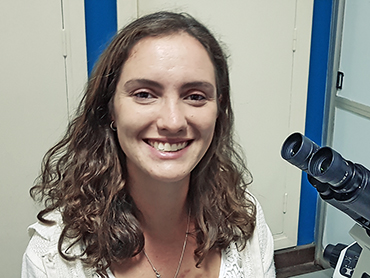FONCyT PhD fellow
Director: Georgina Fabro
E-Mail: fbogino@fcq.unc.edu.ar
PhD Thesis Topic
Oomycete pathogen effector proteins and their impact on plant defense and growth
Pathogen microorganisms harbor conserved molecules that are essential to their fitness, known as Pathogen Associated Molecular Patterns (PAMPs). Certain plant hosts can recognize these molecules as non-self, triggering a first layer of defense responses, called PAMP Triggered Immunity (PTI). Adapted pathogens evolved effectors: secreted proteins delivered to the plant cells that make them capable to overcome those defense responses. However, some plants also evolved to recognize effectors and activate yet another layer of defense responses, called Effector Triggered Immunity (ETI).
HaRxL106 is an effector from the oomycete Hyaloperonospora arabidopsidis, an obligated biotrophic pathogen of Arabidopsis thaliana. Previous studies indicate that transgenic plants constitutively expressing HaRxL106 are more susceptible to different biotrophic pathogens and also phenocopy the Shade Avoidance Syndrome (SAS) in normal light conditions. In planta, HaRxL106 physically interacts with a transcription factor that participates in the signaling pathway of the Brassinosteroids (BRs). Those vegetal hormones regulate plant growth and are instrumental to establish the SAS. The aim of this thesis is to elucidate if there is a causal relationship between the observed plant phenotypes of hypersusceptibility and SAS-like growth and the BRs pathway modulation by HaRxL106.



